CHTM29 - Project: Social Media's Impact on Tourism & Hospitality
VerifiedAdded on 2023/06/15
|8
|2309
|60
Project
AI Summary
This project investigates the impact of social media platforms on the tourism and hospitality industry, focusing on The Harper, a hospitality organization in the United Kingdom. It aims to evaluate how social networking platforms influence the industry, increase sales revenue, provide services during the pandemic, and generally affect people's perceptions of The Harper. The research employs a positivism philosophy and a deductive approach, utilizing a survey strategy with quantitative data collected through questionnaires from 30 Harper employees selected via probability sampling. Data analysis will be conducted using frequency distribution. The project also addresses ethical considerations such as data confidentiality and participant autonomy. Both primary and secondary data collection methods are used, including books, journals, and questionnaires. The time horizon is cross-sectional, and data storage is planned for six months, ensuring secure handling and anonymization of responses.
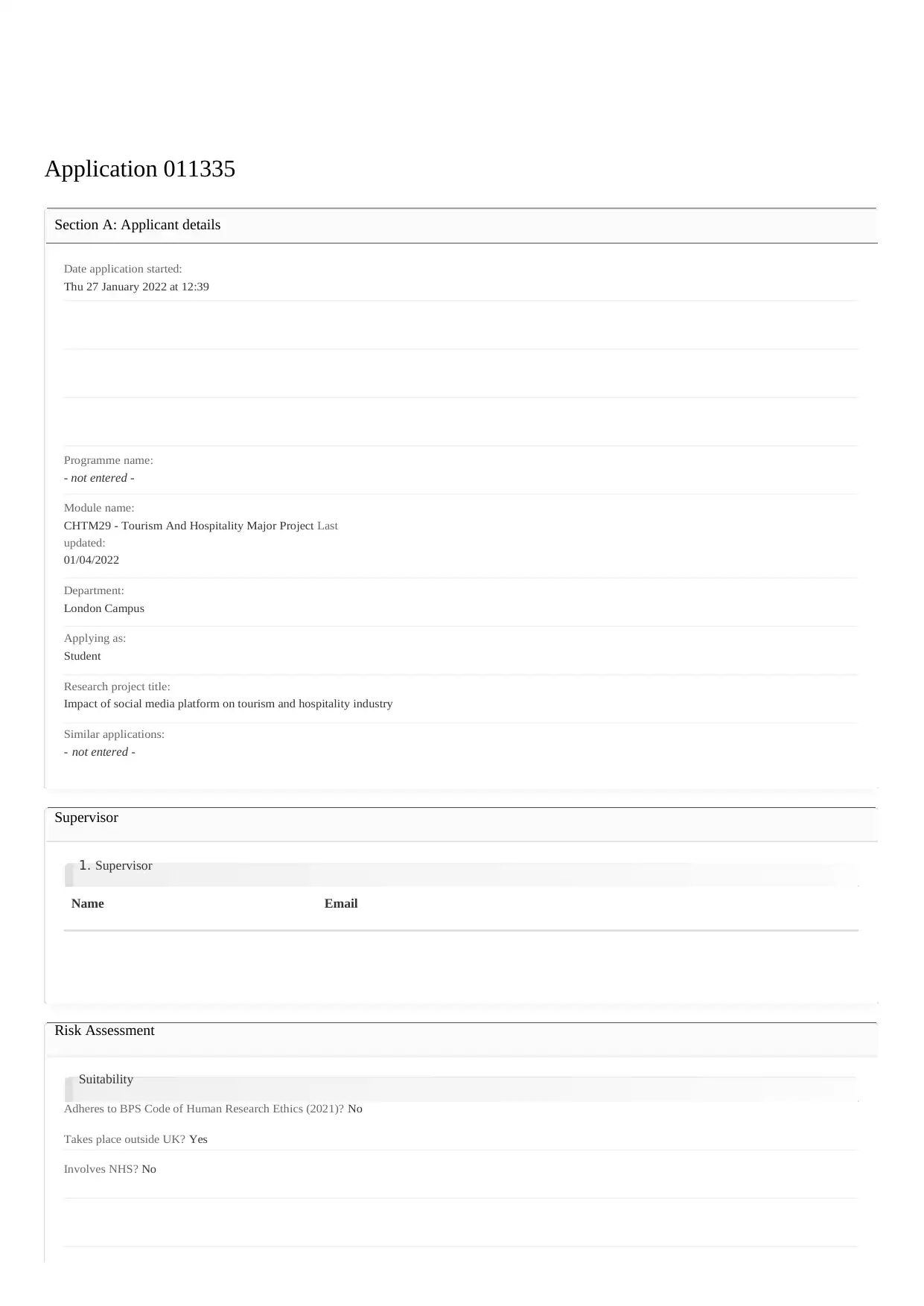
Application 011335
Section A: Applicant details
Date application started:
Thu 27 January 2022 at 12:39
Programme name:
- not entered -
Module name:
CHTM29 - Tourism And Hospitality Major Project Last
updated:
01/04/2022
Department:
London Campus
Applying as:
Student
Research project title:
Impact of social media platform on tourism and hospitality industry
Similar applications:
- not entered -
Supervisor
1. Supervisor
Name Email
Risk Assessment
Suitability
Adheres to BPS Code of Human Research Ethics (2021)? No
Takes place outside UK? Yes
Involves NHS? No
Section A: Applicant details
Date application started:
Thu 27 January 2022 at 12:39
Programme name:
- not entered -
Module name:
CHTM29 - Tourism And Hospitality Major Project Last
updated:
01/04/2022
Department:
London Campus
Applying as:
Student
Research project title:
Impact of social media platform on tourism and hospitality industry
Similar applications:
- not entered -
Supervisor
1. Supervisor
Name Email
Risk Assessment
Suitability
Adheres to BPS Code of Human Research Ethics (2021)? No
Takes place outside UK? Yes
Involves NHS? No
Paraphrase This Document
Need a fresh take? Get an instant paraphrase of this document with our AI Paraphraser
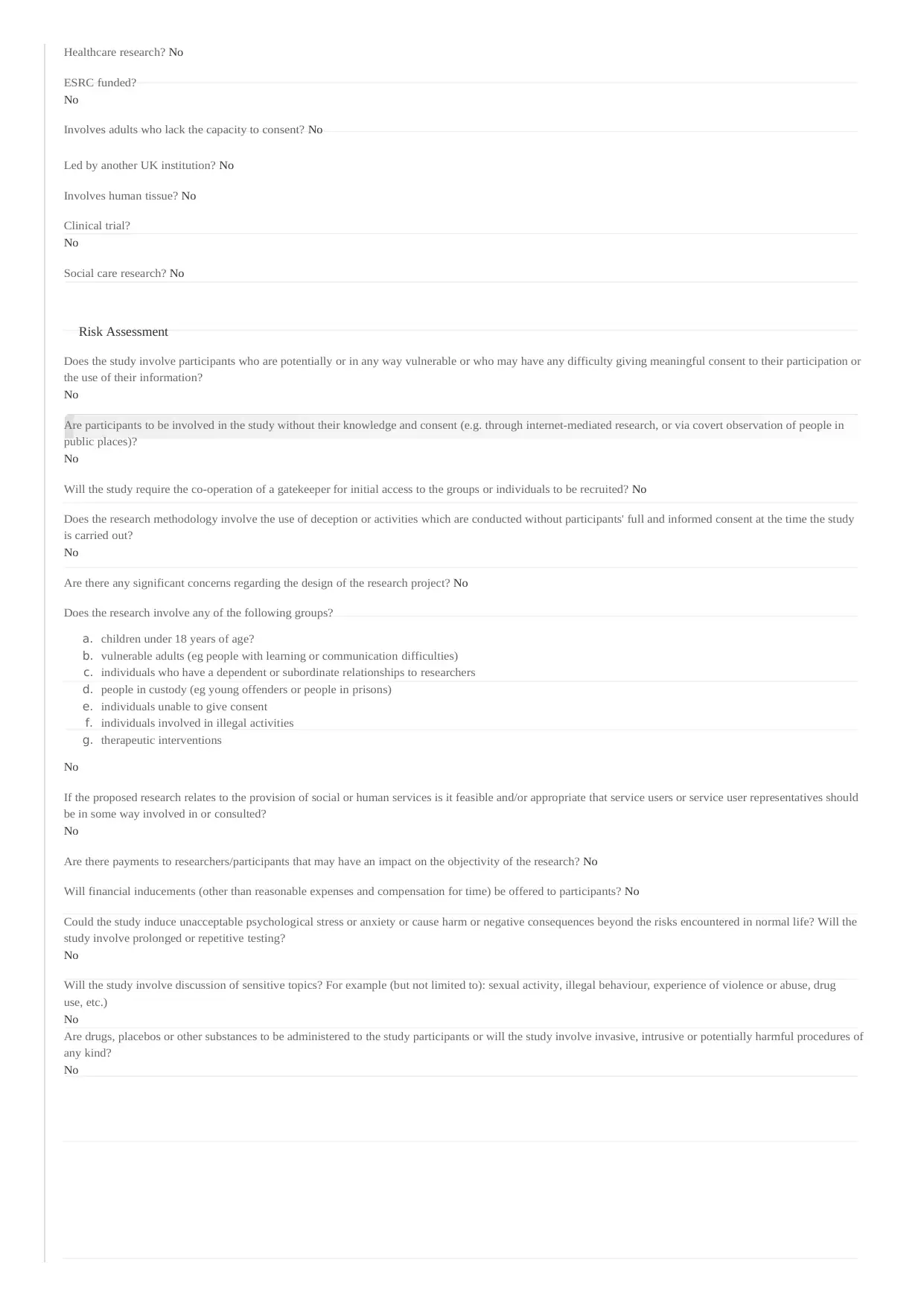
Healthcare research? No
ESRC funded?
No
Involves adults who lack the capacity to consent? No
Led by another UK institution? No
Involves human tissue? No
Clinical trial?
No
Social care research? No
Risk Assessment
Does the study involve participants who are potentially or in any way vulnerable or who may have any difficulty giving meaningful consent to their participation or
the use of their information?
No
Are participants to be involved in the study without their knowledge and consent (e.g. through internet-mediated research, or via covert observation of people in
public places)?
No
Will the study require the co-operation of a gatekeeper for initial access to the groups or individuals to be recruited? No
Does the research methodology involve the use of deception or activities which are conducted without participants' full and informed consent at the time the study
is carried out?
No
Are there any significant concerns regarding the design of the research project? No
Does the research involve any of the following groups?
a. children under 18 years of age?
b. vulnerable adults (eg people with learning or communication difficulties)
c. individuals who have a dependent or subordinate relationships to researchers
d. people in custody (eg young offenders or people in prisons)
e. individuals unable to give consent
f. individuals involved in illegal activities
g. therapeutic interventions
No
If the proposed research relates to the provision of social or human services is it feasible and/or appropriate that service users or service user representatives should
be in some way involved in or consulted?
No
Are there payments to researchers/participants that may have an impact on the objectivity of the research? No
Will financial inducements (other than reasonable expenses and compensation for time) be offered to participants? No
Could the study induce unacceptable psychological stress or anxiety or cause harm or negative consequences beyond the risks encountered in normal life? Will the
study involve prolonged or repetitive testing?
No
Will the study involve discussion of sensitive topics? For example (but not limited to): sexual activity, illegal behaviour, experience of violence or abuse, drug
use, etc.)
No
Are drugs, placebos or other substances to be administered to the study participants or will the study involve invasive, intrusive or potentially harmful procedures of
any kind?
No
ESRC funded?
No
Involves adults who lack the capacity to consent? No
Led by another UK institution? No
Involves human tissue? No
Clinical trial?
No
Social care research? No
Risk Assessment
Does the study involve participants who are potentially or in any way vulnerable or who may have any difficulty giving meaningful consent to their participation or
the use of their information?
No
Are participants to be involved in the study without their knowledge and consent (e.g. through internet-mediated research, or via covert observation of people in
public places)?
No
Will the study require the co-operation of a gatekeeper for initial access to the groups or individuals to be recruited? No
Does the research methodology involve the use of deception or activities which are conducted without participants' full and informed consent at the time the study
is carried out?
No
Are there any significant concerns regarding the design of the research project? No
Does the research involve any of the following groups?
a. children under 18 years of age?
b. vulnerable adults (eg people with learning or communication difficulties)
c. individuals who have a dependent or subordinate relationships to researchers
d. people in custody (eg young offenders or people in prisons)
e. individuals unable to give consent
f. individuals involved in illegal activities
g. therapeutic interventions
No
If the proposed research relates to the provision of social or human services is it feasible and/or appropriate that service users or service user representatives should
be in some way involved in or consulted?
No
Are there payments to researchers/participants that may have an impact on the objectivity of the research? No
Will financial inducements (other than reasonable expenses and compensation for time) be offered to participants? No
Could the study induce unacceptable psychological stress or anxiety or cause harm or negative consequences beyond the risks encountered in normal life? Will the
study involve prolonged or repetitive testing?
No
Will the study involve discussion of sensitive topics? For example (but not limited to): sexual activity, illegal behaviour, experience of violence or abuse, drug
use, etc.)
No
Are drugs, placebos or other substances to be administered to the study participants or will the study involve invasive, intrusive or potentially harmful procedures of
any kind?
No
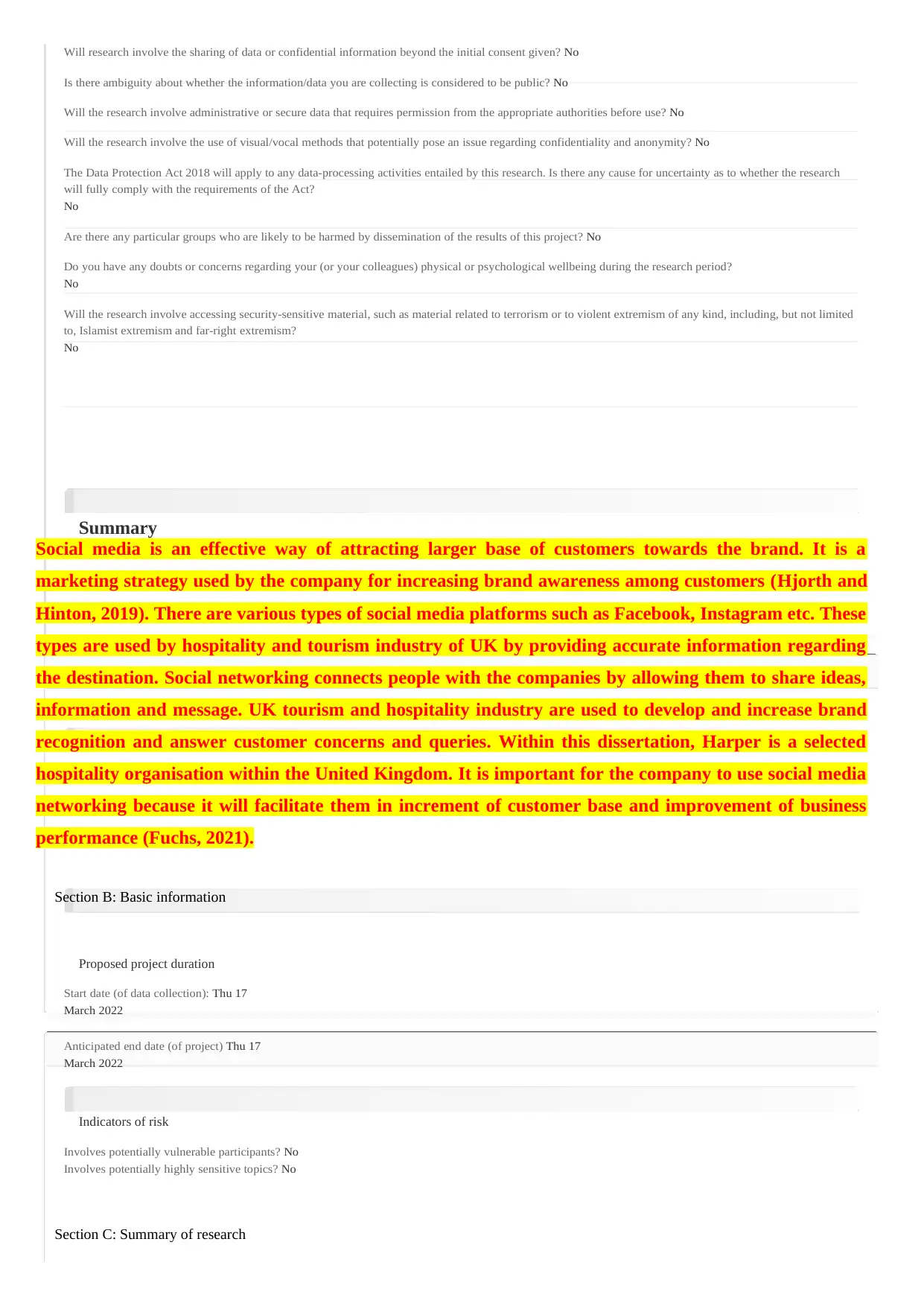
Will research involve the sharing of data or confidential information beyond the initial consent given? No
Is there ambiguity about whether the information/data you are collecting is considered to be public? No
Will the research involve administrative or secure data that requires permission from the appropriate authorities before use? No
Will the research involve the use of visual/vocal methods that potentially pose an issue regarding confidentiality and anonymity? No
The Data Protection Act 2018 will apply to any data-processing activities entailed by this research. Is there any cause for uncertainty as to whether the research
will fully comply with the requirements of the Act?
No
Are there any particular groups who are likely to be harmed by dissemination of the results of this project? No
Do you have any doubts or concerns regarding your (or your colleagues) physical or psychological wellbeing during the research period?
No
Will the research involve accessing security-sensitive material, such as material related to terrorism or to violent extremism of any kind, including, but not limited
to, Islamist extremism and far-right extremism?
No
Summary
Social media is an effective way of attracting larger base of customers towards the brand. It is a
marketing strategy used by the company for increasing brand awareness among customers (Hjorth and
Hinton, 2019). There are various types of social media platforms such as Facebook, Instagram etc. These
types are used by hospitality and tourism industry of UK by providing accurate information regarding
the destination. Social networking connects people with the companies by allowing them to share ideas,
information and message. UK tourism and hospitality industry are used to develop and increase brand
recognition and answer customer concerns and queries. Within this dissertation, Harper is a selected
hospitality organisation within the United Kingdom. It is important for the company to use social media
networking because it will facilitate them in increment of customer base and improvement of business
performance (Fuchs, 2021).
Section B: Basic information
Proposed project duration
Start date (of data collection): Thu 17
March 2022
Anticipated end date (of project) Thu 17
March 2022
Indicators of risk
Involves potentially vulnerable participants? No
Involves potentially highly sensitive topics? No
Section C: Summary of research
Is there ambiguity about whether the information/data you are collecting is considered to be public? No
Will the research involve administrative or secure data that requires permission from the appropriate authorities before use? No
Will the research involve the use of visual/vocal methods that potentially pose an issue regarding confidentiality and anonymity? No
The Data Protection Act 2018 will apply to any data-processing activities entailed by this research. Is there any cause for uncertainty as to whether the research
will fully comply with the requirements of the Act?
No
Are there any particular groups who are likely to be harmed by dissemination of the results of this project? No
Do you have any doubts or concerns regarding your (or your colleagues) physical or psychological wellbeing during the research period?
No
Will the research involve accessing security-sensitive material, such as material related to terrorism or to violent extremism of any kind, including, but not limited
to, Islamist extremism and far-right extremism?
No
Summary
Social media is an effective way of attracting larger base of customers towards the brand. It is a
marketing strategy used by the company for increasing brand awareness among customers (Hjorth and
Hinton, 2019). There are various types of social media platforms such as Facebook, Instagram etc. These
types are used by hospitality and tourism industry of UK by providing accurate information regarding
the destination. Social networking connects people with the companies by allowing them to share ideas,
information and message. UK tourism and hospitality industry are used to develop and increase brand
recognition and answer customer concerns and queries. Within this dissertation, Harper is a selected
hospitality organisation within the United Kingdom. It is important for the company to use social media
networking because it will facilitate them in increment of customer base and improvement of business
performance (Fuchs, 2021).
Section B: Basic information
Proposed project duration
Start date (of data collection): Thu 17
March 2022
Anticipated end date (of project) Thu 17
March 2022
Indicators of risk
Involves potentially vulnerable participants? No
Involves potentially highly sensitive topics? No
Section C: Summary of research
⊘ This is a preview!⊘
Do you want full access?
Subscribe today to unlock all pages.

Trusted by 1+ million students worldwide
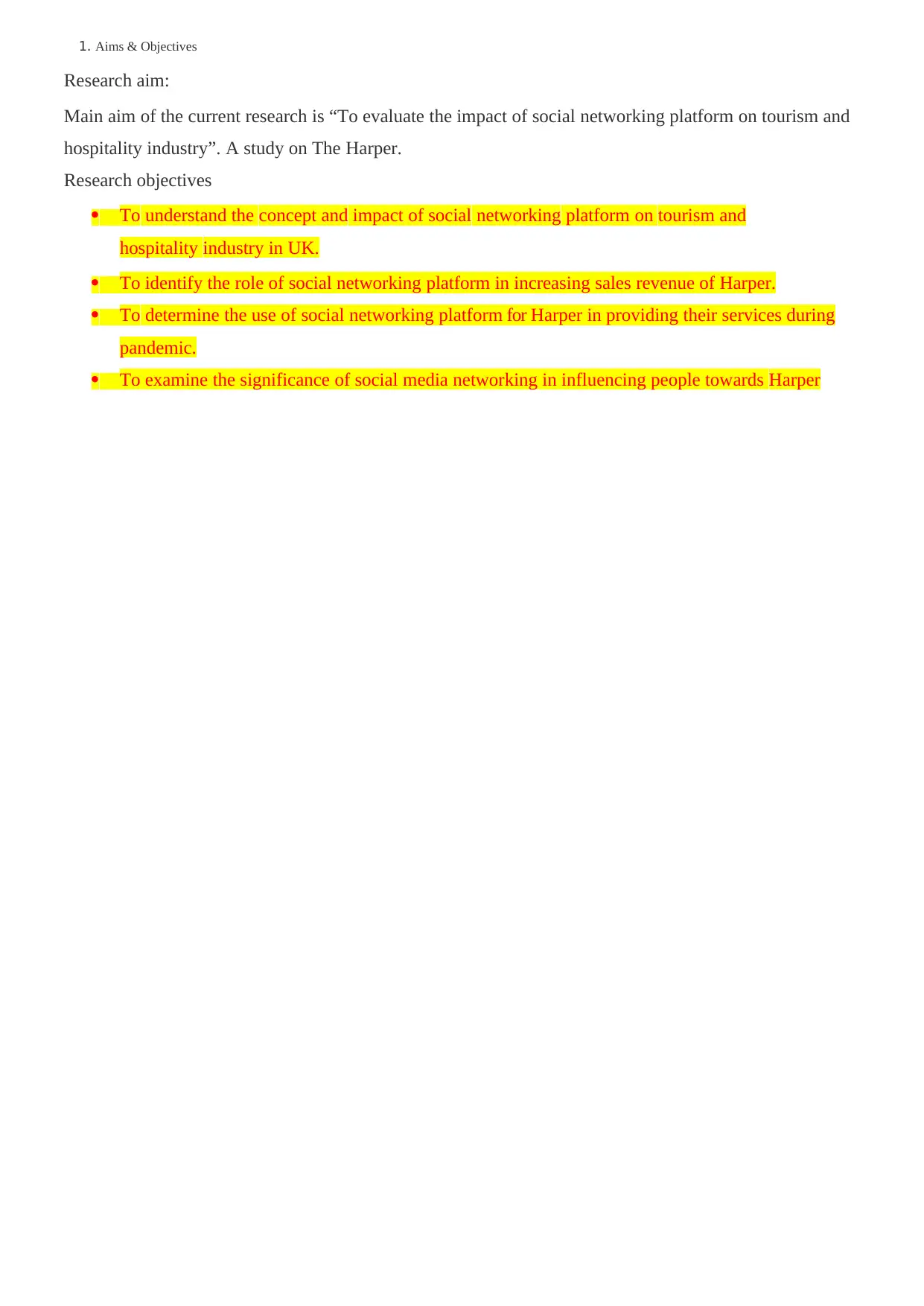
1. Aims & Objectives
Research aim:
Main aim of the current research is “To evaluate the impact of social networking platform on tourism and
hospitality industry”. A study on The Harper.
Research objectives
To understand the concept and impact of social networking platform on tourism and
hospitality industry in UK.
To identify the role of social networking platform in increasing sales revenue of Harper.
To determine the use of social networking platform for Harper in providing their services during
pandemic.
To examine the significance of social media networking in influencing people towards Harper
Research aim:
Main aim of the current research is “To evaluate the impact of social networking platform on tourism and
hospitality industry”. A study on The Harper.
Research objectives
To understand the concept and impact of social networking platform on tourism and
hospitality industry in UK.
To identify the role of social networking platform in increasing sales revenue of Harper.
To determine the use of social networking platform for Harper in providing their services during
pandemic.
To examine the significance of social media networking in influencing people towards Harper
Paraphrase This Document
Need a fresh take? Get an instant paraphrase of this document with our AI Paraphraser
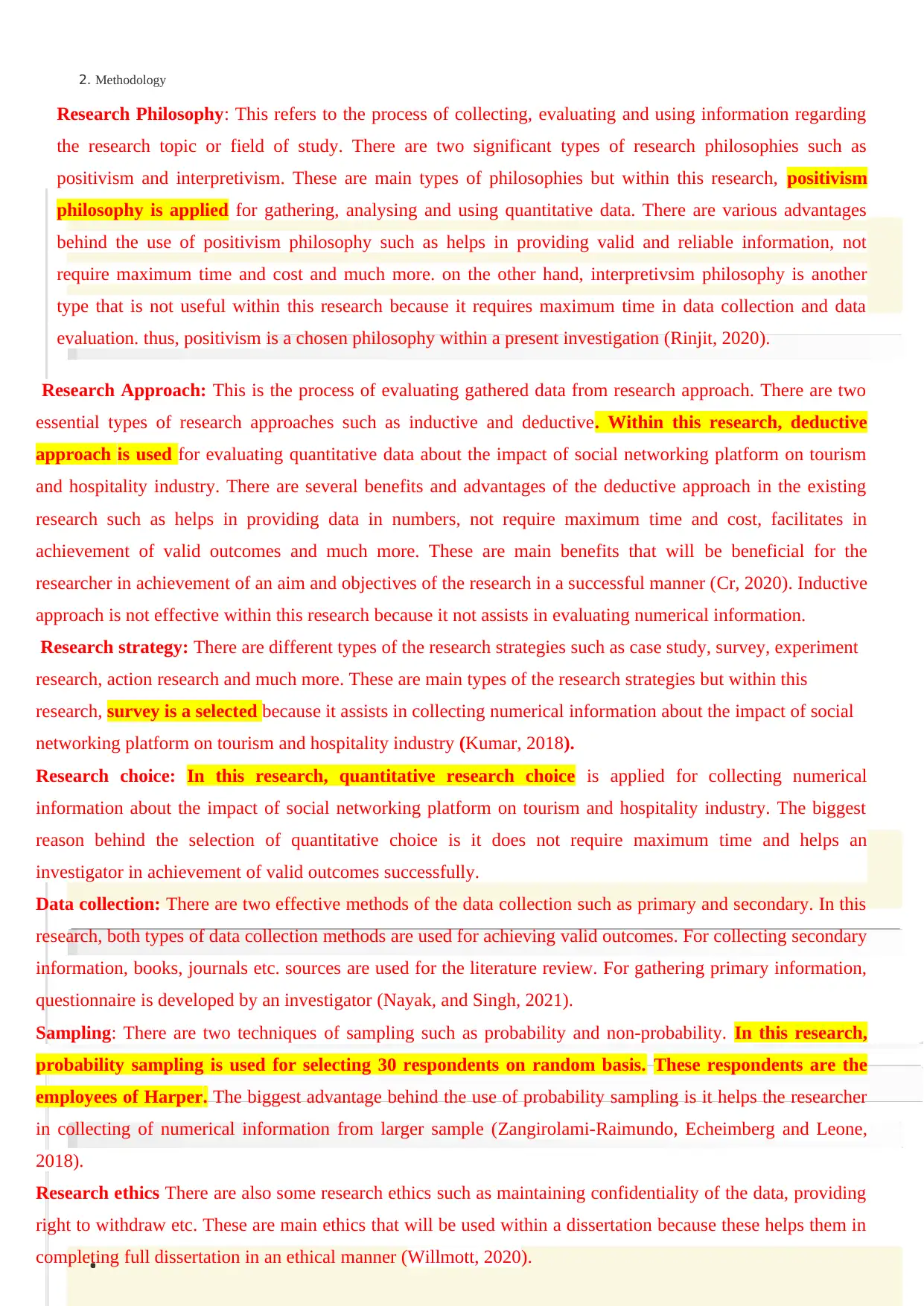
2. Methodology
Research Philosophy: This refers to the process of collecting, evaluating and using information regarding
the research topic or field of study. There are two significant types of research philosophies such as
positivism and interpretivism. These are main types of philosophies but within this research, positivism
philosophy is applied for gathering, analysing and using quantitative data. There are various advantages
behind the use of positivism philosophy such as helps in providing valid and reliable information, not
require maximum time and cost and much more. on the other hand, interpretivsim philosophy is another
type that is not useful within this research because it requires maximum time in data collection and data
evaluation. thus, positivism is a chosen philosophy within a present investigation (Rinjit, 2020).
Research Approach: This is the process of evaluating gathered data from research approach. There are two
essential types of research approaches such as inductive and deductive. Within this research, deductive
approach is used for evaluating quantitative data about the impact of social networking platform on tourism
and hospitality industry. There are several benefits and advantages of the deductive approach in the existing
research such as helps in providing data in numbers, not require maximum time and cost, facilitates in
achievement of valid outcomes and much more. These are main benefits that will be beneficial for the
researcher in achievement of an aim and objectives of the research in a successful manner (Cr, 2020). Inductive
approach is not effective within this research because it not assists in evaluating numerical information.
Research strategy: There are different types of the research strategies such as case study, survey, experiment
research, action research and much more. These are main types of the research strategies but within this
research, survey is a selected because it assists in collecting numerical information about the impact of social
networking platform on tourism and hospitality industry (Kumar, 2018).
Research choice: In this research, quantitative research choice is applied for collecting numerical
information about the impact of social networking platform on tourism and hospitality industry. The biggest
reason behind the selection of quantitative choice is it does not require maximum time and helps an
investigator in achievement of valid outcomes successfully.
Data collection: There are two effective methods of the data collection such as primary and secondary. In this
research, both types of data collection methods are used for achieving valid outcomes. For collecting secondary
information, books, journals etc. sources are used for the literature review. For gathering primary information,
questionnaire is developed by an investigator (Nayak, and Singh, 2021).
Sampling: There are two techniques of sampling such as probability and non-probability. In this research,
probability sampling is used for selecting 30 respondents on random basis. These respondents are the
employees of Harper. The biggest advantage behind the use of probability sampling is it helps the researcher
in collecting of numerical information from larger sample (Zangirolami-Raimundo, Echeimberg and Leone,
2018).
Research ethics There are also some research ethics such as maintaining confidentiality of the data, providing
right to withdraw etc. These are main ethics that will be used within a dissertation because these helps them in
completing full dissertation in an ethical manner (Willmott, 2020).
Research Philosophy: This refers to the process of collecting, evaluating and using information regarding
the research topic or field of study. There are two significant types of research philosophies such as
positivism and interpretivism. These are main types of philosophies but within this research, positivism
philosophy is applied for gathering, analysing and using quantitative data. There are various advantages
behind the use of positivism philosophy such as helps in providing valid and reliable information, not
require maximum time and cost and much more. on the other hand, interpretivsim philosophy is another
type that is not useful within this research because it requires maximum time in data collection and data
evaluation. thus, positivism is a chosen philosophy within a present investigation (Rinjit, 2020).
Research Approach: This is the process of evaluating gathered data from research approach. There are two
essential types of research approaches such as inductive and deductive. Within this research, deductive
approach is used for evaluating quantitative data about the impact of social networking platform on tourism
and hospitality industry. There are several benefits and advantages of the deductive approach in the existing
research such as helps in providing data in numbers, not require maximum time and cost, facilitates in
achievement of valid outcomes and much more. These are main benefits that will be beneficial for the
researcher in achievement of an aim and objectives of the research in a successful manner (Cr, 2020). Inductive
approach is not effective within this research because it not assists in evaluating numerical information.
Research strategy: There are different types of the research strategies such as case study, survey, experiment
research, action research and much more. These are main types of the research strategies but within this
research, survey is a selected because it assists in collecting numerical information about the impact of social
networking platform on tourism and hospitality industry (Kumar, 2018).
Research choice: In this research, quantitative research choice is applied for collecting numerical
information about the impact of social networking platform on tourism and hospitality industry. The biggest
reason behind the selection of quantitative choice is it does not require maximum time and helps an
investigator in achievement of valid outcomes successfully.
Data collection: There are two effective methods of the data collection such as primary and secondary. In this
research, both types of data collection methods are used for achieving valid outcomes. For collecting secondary
information, books, journals etc. sources are used for the literature review. For gathering primary information,
questionnaire is developed by an investigator (Nayak, and Singh, 2021).
Sampling: There are two techniques of sampling such as probability and non-probability. In this research,
probability sampling is used for selecting 30 respondents on random basis. These respondents are the
employees of Harper. The biggest advantage behind the use of probability sampling is it helps the researcher
in collecting of numerical information from larger sample (Zangirolami-Raimundo, Echeimberg and Leone,
2018).
Research ethics There are also some research ethics such as maintaining confidentiality of the data, providing
right to withdraw etc. These are main ethics that will be used within a dissertation because these helps them in
completing full dissertation in an ethical manner (Willmott, 2020).
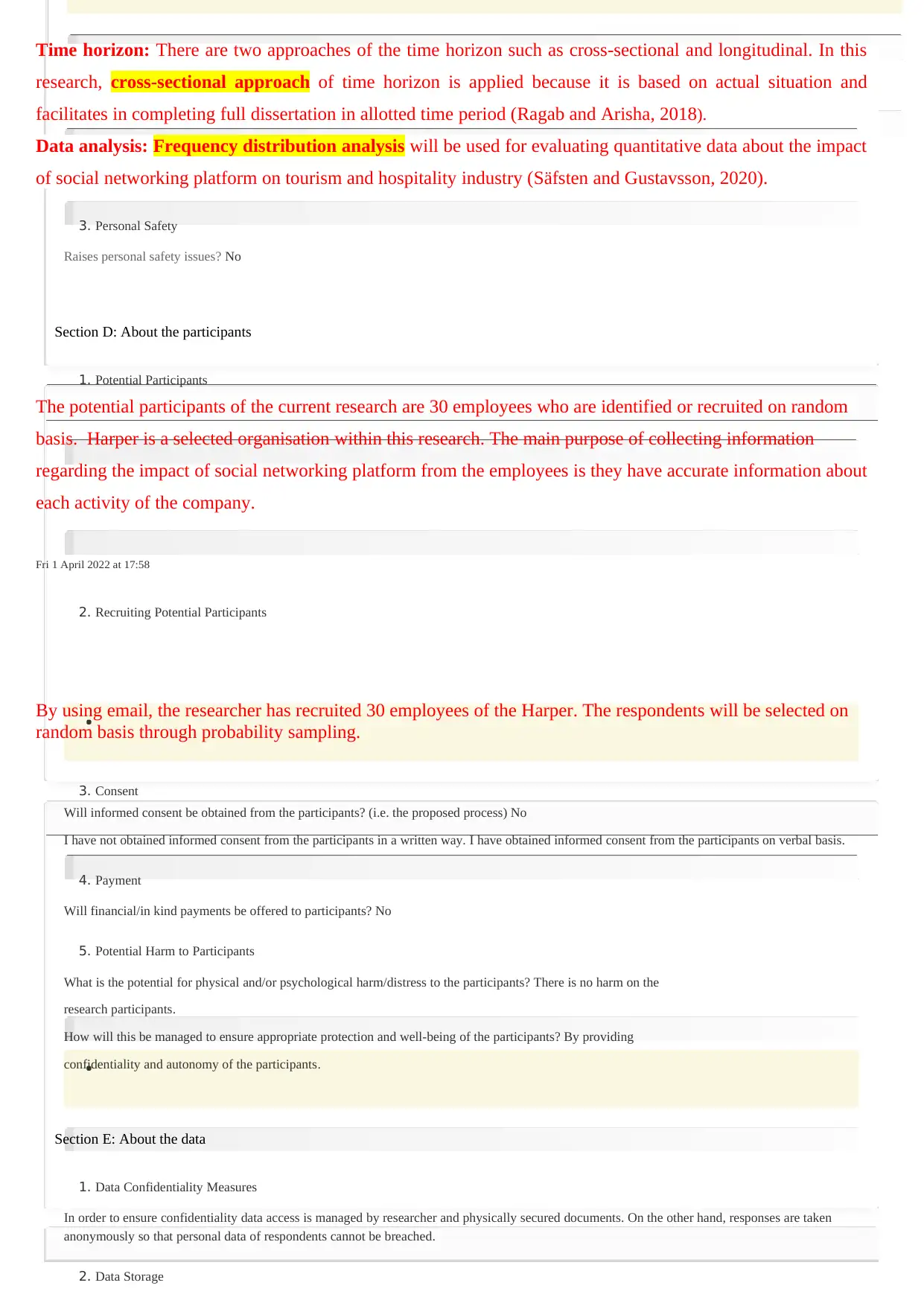
Time horizon: There are two approaches of the time horizon such as cross-sectional and longitudinal. In this
research, cross-sectional approach of time horizon is applied because it is based on actual situation and
facilitates in completing full dissertation in allotted time period (Ragab and Arisha, 2018).
Data analysis: Frequency distribution analysis will be used for evaluating quantitative data about the impact
of social networking platform on tourism and hospitality industry (Säfsten and Gustavsson, 2020).
3. Personal Safety
Raises personal safety issues? No
Section D: About the participants
1. Potential Participants
The potential participants of the current research are 30 employees who are identified or recruited on random
basis. Harper is a selected organisation within this research. The main purpose of collecting information
regarding the impact of social networking platform from the employees is they have accurate information about
each activity of the company.
Fri 1 April 2022 at 17:58
2. Recruiting Potential Participants
By using email, the researcher has recruited 30 employees of the Harper. The respondents will be selected on
random basis through probability sampling.
3. Consent
Will informed consent be obtained from the participants? (i.e. the proposed process) No
I have not obtained informed consent from the participants in a written way. I have obtained informed consent from the participants on verbal basis.
4. Payment
Will financial/in kind payments be offered to participants? No
5. Potential Harm to Participants
What is the potential for physical and/or psychological harm/distress to the participants? There is no harm on the
research participants.
How will this be managed to ensure appropriate protection and well-being of the participants? By providing
confidentiality and autonomy of the participants.
Section E: About the data
1. Data Confidentiality Measures
In order to ensure confidentiality data access is managed by researcher and physically secured documents. On the other hand, responses are taken
anonymously so that personal data of respondents cannot be breached.
2. Data Storage
research, cross-sectional approach of time horizon is applied because it is based on actual situation and
facilitates in completing full dissertation in allotted time period (Ragab and Arisha, 2018).
Data analysis: Frequency distribution analysis will be used for evaluating quantitative data about the impact
of social networking platform on tourism and hospitality industry (Säfsten and Gustavsson, 2020).
3. Personal Safety
Raises personal safety issues? No
Section D: About the participants
1. Potential Participants
The potential participants of the current research are 30 employees who are identified or recruited on random
basis. Harper is a selected organisation within this research. The main purpose of collecting information
regarding the impact of social networking platform from the employees is they have accurate information about
each activity of the company.
Fri 1 April 2022 at 17:58
2. Recruiting Potential Participants
By using email, the researcher has recruited 30 employees of the Harper. The respondents will be selected on
random basis through probability sampling.
3. Consent
Will informed consent be obtained from the participants? (i.e. the proposed process) No
I have not obtained informed consent from the participants in a written way. I have obtained informed consent from the participants on verbal basis.
4. Payment
Will financial/in kind payments be offered to participants? No
5. Potential Harm to Participants
What is the potential for physical and/or psychological harm/distress to the participants? There is no harm on the
research participants.
How will this be managed to ensure appropriate protection and well-being of the participants? By providing
confidentiality and autonomy of the participants.
Section E: About the data
1. Data Confidentiality Measures
In order to ensure confidentiality data access is managed by researcher and physically secured documents. On the other hand, responses are taken
anonymously so that personal data of respondents cannot be breached.
2. Data Storage
⊘ This is a preview!⊘
Do you want full access?
Subscribe today to unlock all pages.

Trusted by 1+ million students worldwide
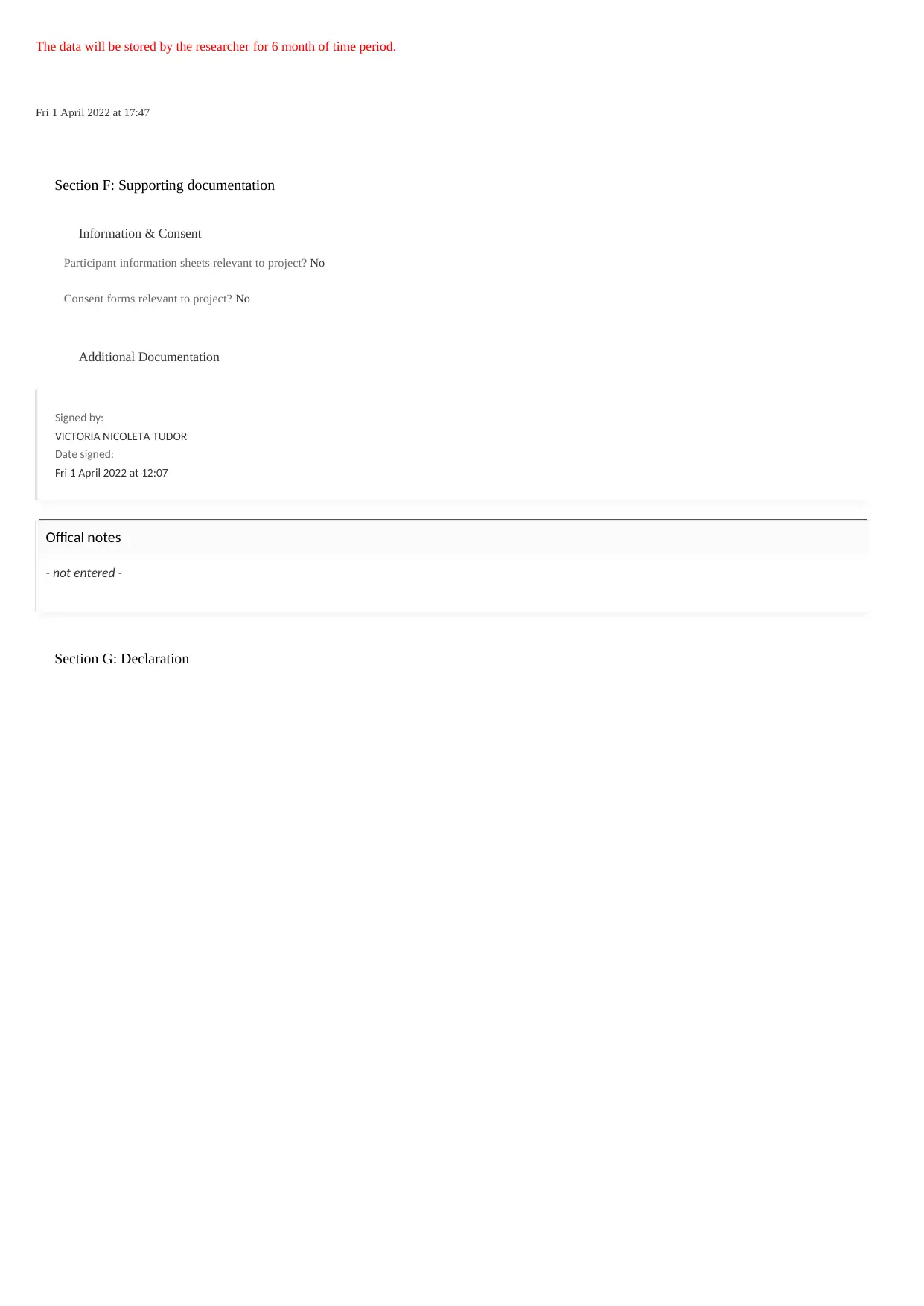
The data will be stored by the researcher for 6 month of time period.
Fri 1 April 2022 at 17:47
Section F: Supporting documentation
Information & Consent
Participant information sheets relevant to project? No
Consent forms relevant to project? No
Additional Documentation
add your research proposal
Fri 1 April 2022 at 18:08
External Documentation
- not entered -
Section G: Declaration
Signed by:
VICTORIA NICOLETA TUDOR
Date signed:
Fri 1 April 2022 at 12:07
Offical notes
- not entered -
Fri 1 April 2022 at 17:47
Section F: Supporting documentation
Information & Consent
Participant information sheets relevant to project? No
Consent forms relevant to project? No
Additional Documentation
add your research proposal
Fri 1 April 2022 at 18:08
External Documentation
- not entered -
Section G: Declaration
Signed by:
VICTORIA NICOLETA TUDOR
Date signed:
Fri 1 April 2022 at 12:07
Offical notes
- not entered -
Paraphrase This Document
Need a fresh take? Get an instant paraphrase of this document with our AI Paraphraser
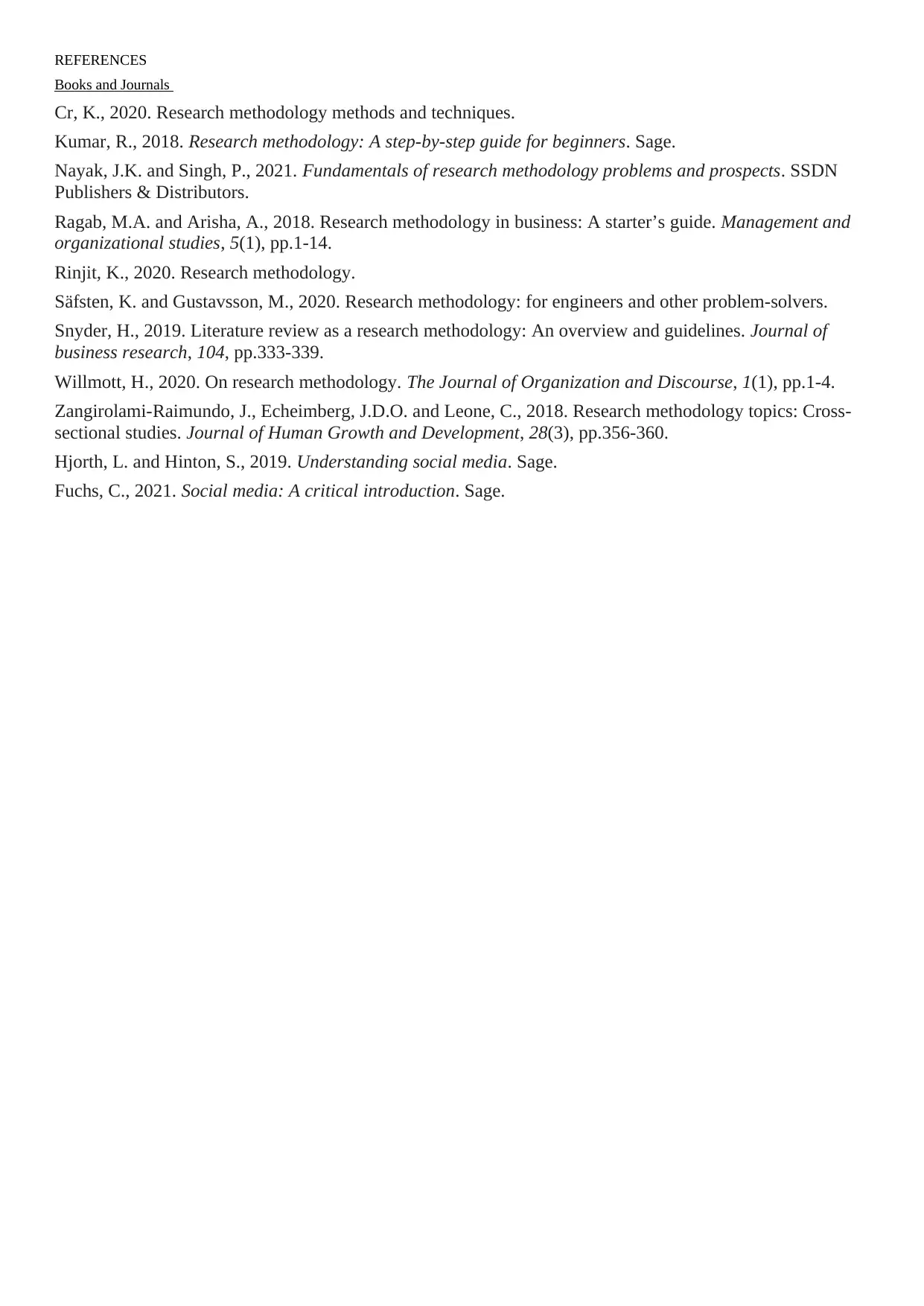
REFERENCES
Books and Journals
Cr, K., 2020. Research methodology methods and techniques.
Kumar, R., 2018. Research methodology: A step-by-step guide for beginners. Sage.
Nayak, J.K. and Singh, P., 2021. Fundamentals of research methodology problems and prospects. SSDN
Publishers & Distributors.
Ragab, M.A. and Arisha, A., 2018. Research methodology in business: A starter’s guide. Management and
organizational studies, 5(1), pp.1-14.
Rinjit, K., 2020. Research methodology.
Säfsten, K. and Gustavsson, M., 2020. Research methodology: for engineers and other problem-solvers.
Snyder, H., 2019. Literature review as a research methodology: An overview and guidelines. Journal of
business research, 104, pp.333-339.
Willmott, H., 2020. On research methodology. The Journal of Organization and Discourse, 1(1), pp.1-4.
Zangirolami-Raimundo, J., Echeimberg, J.D.O. and Leone, C., 2018. Research methodology topics: Cross-
sectional studies. Journal of Human Growth and Development, 28(3), pp.356-360.
Hjorth, L. and Hinton, S., 2019. Understanding social media. Sage.
Fuchs, C., 2021. Social media: A critical introduction. Sage.
Books and Journals
Cr, K., 2020. Research methodology methods and techniques.
Kumar, R., 2018. Research methodology: A step-by-step guide for beginners. Sage.
Nayak, J.K. and Singh, P., 2021. Fundamentals of research methodology problems and prospects. SSDN
Publishers & Distributors.
Ragab, M.A. and Arisha, A., 2018. Research methodology in business: A starter’s guide. Management and
organizational studies, 5(1), pp.1-14.
Rinjit, K., 2020. Research methodology.
Säfsten, K. and Gustavsson, M., 2020. Research methodology: for engineers and other problem-solvers.
Snyder, H., 2019. Literature review as a research methodology: An overview and guidelines. Journal of
business research, 104, pp.333-339.
Willmott, H., 2020. On research methodology. The Journal of Organization and Discourse, 1(1), pp.1-4.
Zangirolami-Raimundo, J., Echeimberg, J.D.O. and Leone, C., 2018. Research methodology topics: Cross-
sectional studies. Journal of Human Growth and Development, 28(3), pp.356-360.
Hjorth, L. and Hinton, S., 2019. Understanding social media. Sage.
Fuchs, C., 2021. Social media: A critical introduction. Sage.
1 out of 8
Related Documents
Your All-in-One AI-Powered Toolkit for Academic Success.
+13062052269
info@desklib.com
Available 24*7 on WhatsApp / Email
![[object Object]](/_next/static/media/star-bottom.7253800d.svg)
Unlock your academic potential
Copyright © 2020–2026 A2Z Services. All Rights Reserved. Developed and managed by ZUCOL.





